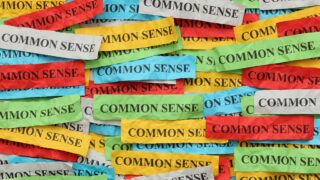Leading High Performing Remote Teams
How can leaders ensure that performance remains high in remote or hybrid-work environments?
Content Marketing
In this course, you’ll learn how compelling blogs, videos, podcasts, and other media can reach customers and drive sales. You’ll also learn steps for creating an effective content marketing plan, and some important ways to measure its impact and success.
Content marketing is a essential digital marketing strategy for companies looking to provide relevant and useful information to support your community and attract new customers.
Get started on your content marketing journey today.
Sustainable Innovation in Times of Disruption: Choices for a Better Society
There are opportunities for progress all around us. The key is to innovate on these opportunities sustainably.
To help identify most effective path forward, you'll need to gain a global perspective to these challenges in an open discussion. How can Japan and the world take action to create a more sustainable, innovative world? Where do you fit in?
It's time to find out.
Social Media & Digital Communications: Impact on Global Public Opinion
Social and digital media have dominated the communications industry for decades. But it's no secret that social media has the power to sway public opinion, and the way in which many companies use these platforms could be seen as manipulative.
What do companies need to be aware of when utilizing social and digital media? How can these mediums be used to better communicate strategically with the world?
Discover what top media and communications experts have to say.
CAGE Distance Framework
Want to expand overseas? The CAGE distance framework can help ensure you're constructing a solid global strategy in four areas: cultural, administrative, economic, and geographic. Learn how to leverage useful differences between countries, identify potential obstacles, and achieve global business success.
Servant Leadership
There's more to leadership than driving a team to profit. In fact, there's a word for looking beyond self-interest to prioritize individual growth: servant leadership. Try this course for a quick breakdown of what that is, how it works, and how it can lead to organizational success.
Strategy: Creating Value Inside Your Company
Have you ever wondered why certain companies are more successful than others? The answer is strategy: internal processes that control costs, allocate resources, and create value. This course from GLOBIS Unlimited can give you the tools you need for that strategic edge.
Strategy: Understanding the External Environment
To plan strategy on any level, you need to understand your company's external environment. In fact, your level of understanding can impact hiring, budgeting, marketing, or nearly any other part of the business world. Want to learn how to do all that? This course from GLOBIS Unlimited is the perfect first step!
Using Japanese Values to Thrive in Global Business
Japanese companies have unique cultural, communication, and operational challenges. But they also have values that have led to remarkable longevity. Check out this seminar to hear how these values help earn trust from overseas head offices and develop employees.
Marketing: Reaching Your Target
Every company works hard to get its products into the hands of customers. Are you doing everything you can to compete? In this course, you’ll find a winning formula to turn a product idea into real sales. Follow along through the fundamentals of the marketing mix and see how companies successfully bring products to market.
Basic Accounting: Financial Analysis
Want to compare your performance vs. a competitor? Or evaluate a potential vendor? Then you'll need to conduct a financial analysis. This course will teach you how to use three financial statements and evaluate financial performance in terms of profitability, efficiency, soundness, growth, and overall strength.
Career Anchors
What drives you to be good at your job?
Career anchors are based on your values, desires, motivations, and abilities. They are the immovable parts of your professional self-image that guide you throughout your career journey.
Try this short GLOBIS Unlimited course to identify which of the eight career anchors is yours!
Leadership with Passion through Kokorozashi
The key ingredient to success? Passion.
Finding your kokorozashi will unify your passions and skills to create positive change in society. This GLOBIS Unlimited course will help you develop the values and lifelong goals you need to become a strong, passion-driven leader.
Every day, we are watching in real time as COVID-19 incites a smart working revolution. Companies are embracing new technology and distributed work is becoming the norm. A change that CEOs have tried to implement for years has become a reality for millions of people in a matter of weeks.
But in thirty years, will we remember the extraordinary measures it took to get here? Or will we slip into collective amnesia? After all, that’s happened before.
The human price paid during wars, pandemics, and other forms of global crisis is awful, but the future economic and social effects are not necessarily so. After all, we do not yet live in a binary system where choices are limited to wholly good or wholly tragic outcomes. WWI gave us the first airplanes, not to mention new methods of photography, sound recording, and communication. Afterward, Germany’s financial hardship from having to pay billions in reparations led to its transition to a welfare state.
The status of women, too, improved dramatically after WWI. They became a major part of the labor force, started wearing trousers, and gained the right to vote. And yet, a century later, there’s still discrimination between the sexes. This, despite growing proof that women are genetically stronger than men, as shown by a higher survival rate during coronavirus.
The problem is, as we adjust to the new reality coming out of a catastrophe, we adapt quickly. We embrace collective amnesia and forget.
Next Article
How to Keep “Common Sense” from Ruining Diversity of Thought
3 NON-Pandemic Reasons Your Team Wants to Stay Remote
Collective Amnesia in Our Pursuit of Happiness
Human memory can only process a limited amount of information and, as Yuval Harari wrote in the Financial Times, this makes it easy for us to forget the weight of extraordinary measures if they’re left in place long enough. We can even forget they’re there entirely. Israel, for example, has yet to remove many of the “temporary” measures put in place in 1948 during the War of Independence.
Consider: How has the COVID-19 pandemic affected you? Your family members? Your country? What have you already forgotten, and what will you forget?
In 2050, will we still be washing our hands for twenty seconds? Or wearing masks when we have cold or flu symptoms? Social distancing? And will we remember why?
How long will it take us to forget that this health crisis has lowered pollution levels—an area where each world summit has failed? Will we ignore the human misery in our history, as was done with the photos included with the Voyager probe in 1977, depicting only human successes and skirting mention of Hiroshima and Auschwitz?
Nobel-awarded Daniel Kahneman mentions that happiness is how you feel about your life while you are living it, while satisfaction is how you feel about your life while you are thinking about it. And data suggests that satisfaction is more important than happiness.
Unfortunately, during this quarantine, we’re observing a search for happiness. We see it in the 652% sales increase of bread machines, as well as in the 44% and 34% respective decrease of telescope and musical instrument sales. Most people would admit that changes in consumer behavior have made humans more selfish. However, they probably wouldn’t be able to tell you how those changes happened.
In fact, it can be traced back to the Hollywood narrative, the cultural arm of the Marshall plan in the 50s which promoted an aspirational, individualistic consumer society and lifestyle. This history, despite its detrimental effects, has slipped into our collective amnesia.
And we’re letting the same thing happen again now.
Personal or Politics?
In his novel The Betrothed, Alessandro Manzoni stresses the relationship between truth and lies, false opinions and beliefs. Politicians provide an easy example of this dichotomy. At the beginning of March 2020, President Trump of the United States and President Bolsonaro of Brazil publicly denounced the virus as “just a flu.” President Lopez Obrador of Mexico has insisted that people continue to hug each other, that “nothing is going to happen.” (Encouraging collective amnesia of what we were already seeing at the time.)
Heads of state across the world continued to show a lack of leadership in favor of cheap, nationalist self-promotion. The ego trap continues to delay—or at least complicate—a global solution. This was demonstrated when Trump promised “large sums” for exclusive rights to a vaccine.
Will people remember these betrayals during the next elections? Or are we clinging to ignorance?
We all understand that markets, supply chains, and people are interconnected. The financial stimulus measures of one country will cascade-benefit another. Likewise, refusing to wear a mask or get a vaccine is a choice that impacts others—a truth that is proving slow to catch on. Despite thousands of Americans dying daily of COVID-19, fourteen US states exempted religious gatherings from social isolation stay-at-home orders.
The philosopher Hume said, “Reason is, and ought only to be, the slave of the passions.” This pandemic may come to be remembered as a great ego exercise. Will you remember how the pandemic has affected you? Or will you embrace collective amnesia, forgetting the negative effects with the positive?
Learn from History or Repeat It
Historical change is not easily measurable. In fact, disentangling the contribution of wars from other factors is difficult. But memory is our most powerful tool to avoid repeating our mistakes.
A Japanese engineer named Yanosuke Hirai demonstrated this in the 1960s when he used a devastating tsunami of 869 to argue for moving a nuclear power plant to higher ground. Thanks to advice based on an event centuries earlier, the plant did not suffer damages decades later during the 2011 Fukushima disaster—despite being only seventy-five miles away.
Predictive models from computer simulations and current data are not enough to save us. Great change can, and almost certainly will, come out of this pandemic. But now is the time to pull together by securing our memories, not to pull ahead by accelerating forgetfulness.





